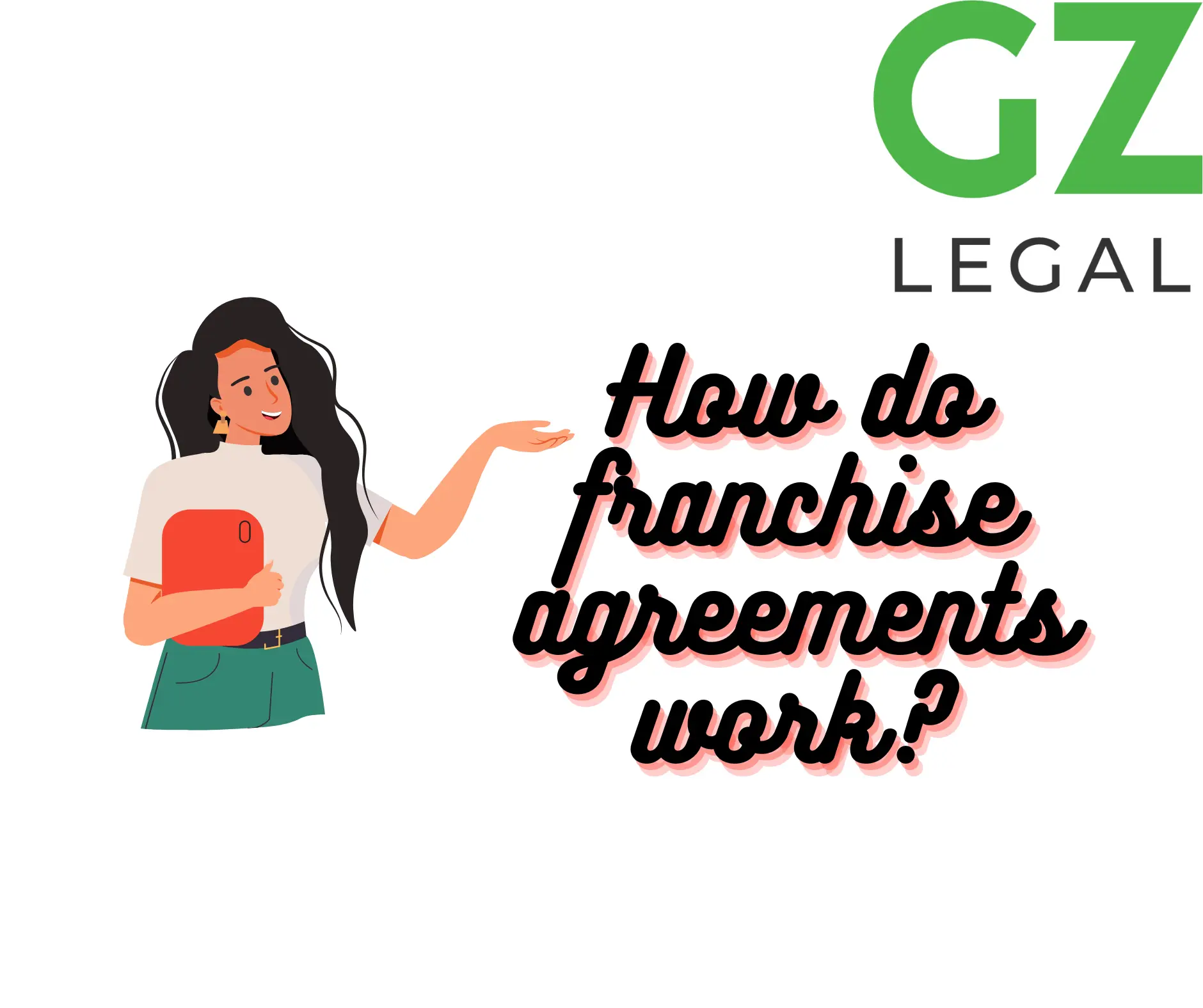Malcolm ZoppiSun Oct 15 2023
How Do Franchise Agreements Work? A Succinct Guide
Franchise agreements lay the foundation for the relationship between franchisors and franchisees.
How Do Franchise Agreements Work? A Succinct Guide

Franchise agreements are the bedrock of any franchising business, establishing the legal terms and conditions between a franchisor and a franchisee. These contracts outline the rights and obligations of both parties, covering aspects proven business model such as brand management, support, and location. Understanding how franchise agreements work is crucial for anyone considering entering the world of franchising, as it helps navigate the complexities and obligations involved.
In a franchise agreement, detailed terms and conditions govern financial aspects, support and training, territory and location, as well as advertising and brand management. Franchise agreements also typically include provisions for legal advice, dispute resolution, exit strategies, and renewal options. So, you will know the answer to the question “how do franchise agreements work?” by first comprehending the key components of a franchise agreement and the necessary tools franchisees gain to operate a successful franchise and maintain a strong relationship with the franchisor.
Key Takeaways
- Franchise agreements lay the foundation for the relationship between franchisors and franchisees.
- Key components include detailed terms and conditions, financial aspects, and training and support.
- Understanding the agreement ensures legal compliance, successful operation, and a strong franchisor-franchisee relationship.
Understanding Franchise Agreements
What is a Franchise Agreement
A franchise agreement is a legally binding contract between a franchisor (the owner of the business) and a franchisee (an individual who wishes to operate the business under the franchisor’s brand and system). This agreement and legally binding document lays the foundation for the relationship between the two parties, outlining the terms, conditions, and expectations for their mutual success.
Key Parties Involved
The two main parties involved in a franchise agreement are:
- Franchisor: The original business owner who provides the franchise system, brand, and support to the franchisee in exchange for a fee, along with ongoing royalties. They are responsible for ensuring the standards and quality of the franchise.
- Franchisee: The individual or party who agrees to operate the franchisor’s business under a licence, adhering to the terms of the franchise agreement. They typically invest their own capital in establishing and maintaining the franchise and are responsible for daily operations.
Functions of a Franchise Agreement
A franchise agreement serves various functions, addressing key aspects of the franchisor-franchisee relationship:
- Grant of Licence: The agreement outlines the franchisee’s licence to use the franchisor’s trademarks, trade names, know-how, and other intellectual property in running the franchise.
- Terms and Conditions: The franchise agreement specifies the terms and conditions the franchisee must abide by, such as providing a consistent level of quality across products and services.
- Training and Support: The franchisor agrees to provide training, operational support, and marketing assistance to the franchisee as outlined in the agreement, ensuring the smooth running of the franchise.
- Financial Obligations: The agreement details the franchise fee, ongoing royalties, and other financial obligations, such as marketing fees, that the franchisee must pay to the franchisor.
- Duration: The franchise agreement states the length of the contract, which usually ranges from a few years to several decades, with possible renewal terms included.
Overall, the franchise agreement serves as a roadmap for both franchisor and franchisee, clearly defining their respective roles and responsibilities. By adhering to the terms set forth in the contract, both parties can build a successful, long-lasting business relationship.
Detailed Terms and Conditions

Role of the Franchisor
As a franchisor, your main responsibility is to provide ongoing support and guidance to the franchisee. This may include offering training, providing marketing materials, and ensuring quality control across all your prospective franchisee and locations. Additionally, you need to continuously develop and improve the products or services your franchise offers so that your brand remains competitive in the market.
Role of the Franchisee
As a franchisee, your role is to operate your franchise unit according to the system and standards set forth by the franchisor. This includes adhering to all operational guidelines, implementing marketing campaigns, and maintaining a professional and clean environment at your location. Additionally, you are responsible for the day-to-day management of your business, including hiring, training, and scheduling staff.
Intellectual Property Rights
Intellectual property rights are an essential aspect of any franchise agreement. As a franchisee, you are granted the non-exclusive right to use the franchisor’s trademarks, patents, and trade secrets within your franchise territory. In return, you must uphold the quality and reputation of the brand. It is important to note that these rights are typically limited in time and scope, meaning that after the franchise agreement expires ends, you are no longer authorised to use the franchisor’s intellectual property.
Non-Compete Clauses
Non-compete clauses, also known as restrictive covenants, are often included in franchise agreements to protect the franchisor’s business interests. These clauses restrict your ability to open or operate a competing business within a specified territory and time frame. It’s essential to carefully review and understand any non-compete clauses in your franchise agreement, as violating these terms could lead to legal consequences.
Termination Terms
Termination terms outline the circumstances under which either party can end the franchise agreement. As a franchisee, you should be aware of these terms, including any potential penalties or fees associated with the termination. Reasons for termination may include failure to meet performance standards, breach of the franchise agreement outlines other terms, or insolvency. It’s crucial to thoroughly understand these terms and work diligently to maintain compliance with your franchise agreement throughout the duration of the contract.
Financial Aspects

The financial aspects of a franchise agreement are an important part of understanding how they work. This section will cover some key components, such as initial and ongoing fees, royalty payments, and additional costs that you need to be aware of before signing a franchise contract.
Initial and Ongoing Fees
When you enter into a franchise agreement, you are generally required to pay an initial fee, also known as a franchise fee. This fee gives you the right to use the franchisor’s brand, systems, and support. These fees can vary widely depending on the franchise, so it’s important to thoroughly understand what you are paying for.
In addition to the initial fee, there will also be ongoing fees as part of your own franchising agreement arrangement. These can cover a variety of expenses such as:
- Regular training
- Marketing support
- Operational support
- System and software updates
You need to know and understand the payment terms associated with these ongoing fees. They may be charged monthly, quarterly, or annually. Be sure to carefully review the franchise agreement to determine what the payment terms are for each type of ongoing expense.
Royalty Payments
Royalty payments are another key financial aspect of a franchise agreement. The franchisor receives these payments in exchange for their ongoing support and the use of their brand. You, as the franchisee, will typically pay these fees in the form of a percentage of your gross revenues.
It’s essential to know what percentage of your revenues you will be required to pay, and how often these payments are due. Make sure this information is spelled out clearly in your franchise agreement.
Additional Costs
Aside from the initial and ongoing fees, as well as royalty payments, you should also be aware of any additional costs associated with your franchise. These could include:
- Inventory and equipment purchases
- Lease or property expenses
- Insurance and legal costs
- Local taxes and licensing fees
It’s essential to carefully account for these costs when planning your franchise investment. Make sure you have a clear understanding of all financial responsibilities, and consider discussing them with a qualified professional such as an accountant or lawyer before signing a franchise agreement.
Role of Support and Training

Initial Training
As a franchisee, you’ll typically start with an initial training programme provided by the franchisor. This training is designed to get you up to speed on the operations, business model, and proprietary information required for running the franchise. Topics often include brand standards, product or service offerings, marketing strategies, and day-to-day operational procedures. During this period, you’ll also likely receive a comprehensive operations manual, which acts as a guidebook to help you navigate the intricacies of the franchise system.
Ongoing Support
Beyond initial training, franchisors often provide a range of ongoing support services. These can include:
- Marketing and advertising assistance: Franchisors may help with advertising campaigns and promotional materials, ensuring that your franchise is aligned with the overarching brand message.
- Operational guidance: You may receive ongoing support for streamlining processes, implementing new technologies, and optimising business performance.
- Regular training updates: Your franchisor might provide refresher courses, training on new products or services, or updates on new industry regulations.
- Accounting and financial support: Some franchisors offer assistance with financial management, budgeting, and reporting to help you maintain accurate records and optimise your financial performance.
- Networking opportunities: Connecting with other franchisees through events or online forums can provide valuable insights and support from peers facing similar challenges and successes.
Remember, the level of support and training varies from one franchise to one party to another, so make sure to review the franchise agreement to understand the specific support services provided by the franchisor. By taking advantage of these resources, you’ll be better equipped to run your franchise smoothly and successfully.
Importance of Territory and Location

Exclusive Territories
A crucial aspect of a franchise agreement is the territory assigned to you as the franchisee. Exclusive franchises and territories provide you with a specific geographical area where you have exclusive rights to operate your franchise, protecting you from competition with other franchisees of the same brand. This helps ensure the stability and growth potential of your business, as it prevents market saturation and gives you a more secure customer base within your territory.
Being aware of your territory’s demographics and local market trends will also be beneficial when developing your business plan and strategies. It’s essential to ensure that your territory is not too small to restrict the growth of your business, but not too large, making it challenging to manage and serve your customers effectively.
Location Selection
Another vital aspect of a franchise agreement is the location of your franchise unit. This often includes a process for selecting, reviewing, and approving locations. Your franchisor may provide you with support and guidance in identifying the best site for your business. Factors to consider include foot traffic, visibility, competition, accessibility, parking facilities, and demographics of the surrounding area.
It is important to remember that an attractive location can significantly impact the success of your franchise. The right location can lead to increased customer traffic, better brand visibility, and ultimately, higher revenues. Furthermore, negotiating favourable lease terms and adhering to any requirements set by the franchisor, such as design and layout, can also contribute to the overall success of your franchised business itself.
In conclusion, understanding the importance of territory and location within your franchise agreement, franchise disclosure document as well as working closely with your franchisor, will help set the foundation for the success of your franchise venture.
Brand Management and Advertising

Brand Standards
As a franchisee, you need to maintain and adhere to the brand standards set by the franchisor. These standards ensure consistency across all franchise locations, protecting the reputation and value of the brand. Typically, the franchise agreement will outline the specific requirements for brand compliance, ranging from signage and logo usage to uniforms and staff training.
Advertising Requirements
Your franchise agreement will also clarify your advertising responsibilities as a franchisee. Franchisors often provide marketing support and require franchisees to follow a particular marketing strategy to maintain brand consistency and effectiveness. This may include a percentage of your gross revenue being contributed to a national or regional advertising fund. By collaborating on advertising efforts, you can leverage the power of shared marketing resources and benefit from the franchisor’s expertise. Additionally, some franchisors provide franchisees with templates, guidelines, and other valuable resources for local advertising initiatives.
In summary, brand management and advertising play a crucial role in a successful franchise relationship. Ensuring consistency in brand standards and advertising requirements helps maintain the strength and appeal of the brand, ultimately benefiting both franchisor and franchisee.
Legal Advice and Dispute Resolution

Legal Assistance
Seeking legal advice is crucial in understanding your rights and obligations under a franchise agreement. A specialised franchise lawyer or solicitor can help you navigate complex legal terms and ensure compliance with UK regulations. They can also advise you on how to protect your interests and avoid potential pitfalls. Some key areas where you may require legal assistance include:
- Reviewing and negotiating the franchise agreement
- Understanding franchisor’s obligations and franchisee’s responsibilities
- Trademark and intellectual property protection
- Liability and indemnification clauses
Conflict and Resolution
Disputes may arise between franchisors and franchisees due to various reasons, such as lack of communication, misrepresentation, and breaches of the agreement. When faced with a conflict, it’s essential to follow these steps:
- Communicate with the franchisor: Try resolving the issue through open and honest communication with the franchisor. Discuss your concerns and explore possible solutions together.
- Review the franchise agreement: Refer to the dispute resolution clause in your agreement, which might include mediation or arbitration as a means to settle disputes.
- Seek legal advice: If communication efforts fail or the issue is complex, consult a franchise solicitor who can advise you on your rights and best course of action.
- Negotiate a settlement: Aim to reach a negotiated settlement by discussing your concerns, presenting evidence, and finding a mutually beneficial resolution.
- Consider exit strategies: If a resolution isn’t achievable and the relationship deteriorates, explore the possibility of exiting the franchise agreement. Legal grounds for termination might include misrepresentation, fraudulent activities, or breaches by the franchisor.
Throughout the dispute resolution process, maintain a confident, knowledgeable, and neutral approach to find a fair outcome that benefits both parties. Remember, focusing on clear communication and seeking expert legal guidance can help protect your interests and foster a successful franchisor-franchisee relationship.
Exit Strategies and Renewal

Exit Strategies
Termination of franchise agreements may prove to be a difficult task. Firstly, review your franchise agreement carefully to understand the terms and conditions that apply to your own exit plan. Franchisees may sell their interest in a franchise to either the franchisor or a separate third party, providing a clear exit route.
To pursue a proper exit strategy, ensure that you follow all necessary rules and regulations set forth in your contract. Be prepared for any potential challenges, disputes, and the possible involvement of solicitors while ending the agreement.
Contract Renewal
Franchise agreements must be renewed once the contract term has expired if you wish to continue operating under the franchise. This renewal, however, is not guaranteed. It depends on your adherence to the franchise agreement work it’s conditions and how well you perform throughout the contract term.
Arrange a meeting with the franchisor well in advance of the contract expiry date to discuss renewal terms and conditions. This proactive approach is important, as renewal rights in employment agreements are not automatic for franchisees. When negotiating, aim for terms that are fair to both you and the franchisor, ensuring a successful and collaborative ongoing partnership.
Frequently Asked Questions
What are the key elements of a franchise agreement?
A franchise agreement is a legal document outlining the terms and conditions between the franchisee and the franchisor. Key elements include franchise fees, the franchisor’s involvement in your business operation, financial statements from the franchisor, and their obligations to provide support and training for new franchise business. This agreement also details the duration of the contract and the territory in which your franchise will operate.
What are the common obligations for franchisees?
As a franchisee, you’ll have to adhere to certain parameters outlined in the agreement. These may include maintaining the franchisor’s brand standards, purchasing supplies from franchise network and approved suppliers, participating in the franchisor’s marketing and advertising campaigns, completing ongoing training and assessment, and paying regular fees such as royalties and marketing fees.
How can a franchise agreement be terminated?
Termination of a franchise agreement can occur under several circumstances, including the expiration of the contract term, mutual agreement between the franchisor and franchisee, or through a breach of contract. Breach of contract may involve non-payment of fees, failure to maintain brand standards, or other violations of the terms and conditions of the agreement.
How are franchise fees typically structured?
Franchise fees typically consist of an upfront franchise fee, ongoing royalty fees, and marketing fees. The upfront initial franchise fee is a one-time payment made to the franchisor upon signing the agreement. Ongoing royalty fees are usually a percentage of your gross sales, payable to the franchisor on a regular basis. Marketing fees, also ongoing, are contributions towards the franchisor’s marketing programmes and may be a fixed amount or percentage of gross sales.
What is the duration of a standard franchise agreement?
The duration of a standard franchise agreement varies depending on the industry and the franchisor. Generally, agreements can span from five to twenty years, with the possibility of renewal upon expiration of the initial term. It’s important to review the specific term length in your agreement to ensure you understand the commitment being made.
How is a territory defined in a franchise agreement?
A territory in a franchise agreement refers to the geographical area in which the franchisee is authorised to operate their franchise business. Territories can be defined by town, city, postcode, or other geographical parameters. These territories are typically exclusive, meaning that no other franchisee within the same brand can open a location within your assigned territory.
Find out more!
If you want to read more in this subject area, you might find some of our other blogs interesting:
- Step-by-Step Guide on How to Transfer Shares to a Holding Company
- Breach of Settlement Agreement: Consequences and Remedies Explained
- Who Gets the Money When a Company is Sold?
- What is a Counter Offer in Contract Law? Explained Simply and Clearly
- Understanding the Costs: How Much Do Injunctions Cost in the UK?
Disclaimer: This document has been prepared for informational purposes only and should not be construed as legal or financial advice. You should always seek independent professional advice and not rely on the content of this document as every individual circumstance is unique. Additionally, this document is not intended to prejudge the legal, financial or tax position of any person.